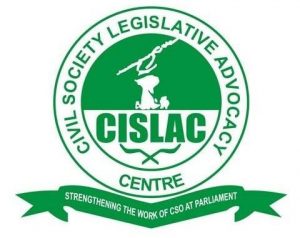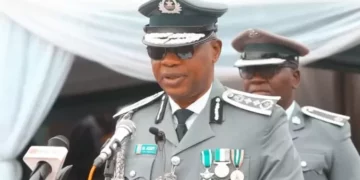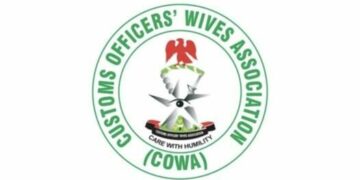The Civil Society Legislative Advocacy Centre (CISLAC), has said, while tax incentives can be valuable tools for stimulating investment and economic activity, unchecked tax expenditures can strain public finances and hinder revenue generation.
The body, therefore, said there is a pressing need for a comprehensive review of existing tax incentives to ensure their effectiveness, efficiency, and alignment with national development priorities.
The executive director, CISLAC, Auwal Ibrahim Musa, while addressing Nigeria’s Fiscal Challenges: A Comprehensive Approach, delivered at a media presentation in Lagos, noted that, Nigeria’s overall debt burden reaching a staggering N97.34 trillion in the fourth quarter of 2023 from N87.9 trillion ($114.3 billion) as of June 2023,calls for a thorough policy review and action.
Musa said Nigeria is currently confronting a severe fiscal crisis marked by a consistent decline in federal government revenue over the past half-decade. Central to this concern is the government’s overreliance on unsustainable debts which is perpetuated by unrealistic/over bloated budgets, weak revenue mobilisation efforts, misplaced spending priorities and a lack of transparency and accountability in public finance management.
This alarming trend is evidenced by substantial shortfalls in revenue, with deficits ranging from 31 per cent to as high as 50 per cent in the years spanning 2018 to 2023.
The CISLAC executive director noted that, while Nigeria’s debt profile continues to grow, and it allocates most of its budget revenue to debt servicing at the expense of investing in more critical social sectors and infrastructural development, there has been a wide consensus around he reasonability/sincerity of purpose behind external borrowings.
In November 2023, the Government signed a $2.8 billion supplementary budget that included funding for new bulletproof cars for the President and First Lady, a Presidential yacht, and renovations of the President’s residential quarters amid a nation-wide cost-of-living crisis, he said.
This, according to him, coincided with a Presidential request to the Senate for the approval of an external loan facility of $7.86 billion and 100 million euros, saying, government has also mortgaged its crude oil reserves in Debt for future crude arrangements- Project Eagle in 2020 and the recent Afrexim “pre-export finance facility” worth $3.3 billion at an 11.85 per cent per annum interest rate.
He also revealed that 37 per cent of Nigeria’s total external debt figure is owed to private creditors and the government will spend six times more on servicing debts than on building new schools and hospitals in 2024.
Musa, further added that, non-objective assessment of debt sustainability using Debt-to-GDP ratio, which puts us at a moderate risk of debt distress at 41.15 per cent despite being above the DMO’s self-imposed threshold of 40 per cent) as against Debt-to-revenue ratio (which stands at 73.5 per cent and still above the DMO’s 50 per cent self-imposed threshold for 2023).
He also observed lack of accountability mechanism in utilisation of loans for the purpose for which they were granted/taken, while the 2020 annual audit report published by the Auditor-General of the Federation revealed there was no document to show the movement and spending of the $3.4 billion COVID-19 emergency financing package loaned to Nigeria in April 2020 by the International Monetary Fund (IMF).
Compounding Nigeria’s fiscal woes are significant revenue losses attributed to tax expenditures, encompassing incentives, exemptions, credits, and waivers. According to the 2021 Tax Expenditure Statement (TES), revenue foregone due to tax expenditures accounted for approximately four per cent of GDP, equating to N6.8 trillion, he said.
This substantial leakage of revenue, it said ,underscores the urgency of addressing tax expenditure and debt management issues with utmost priority.
In response to these multifaceted challenges, the Civil Society Legislative Advocacy Centre and the Tax Justice and Governance Platform with support from Christian Aid Nigeria through an ongoing Debt Justice campaign, have undertaken several sensitization engagements with civil society and media as well as policy engagements with relevant state actors, most of which have been informed by our research on tax expenditures and its implications on debt management and sustainability in Nigeria.
“We believe that governments at all levels need to acknowledge the critical importance of formulating, implementing and monitoring fiscal policies that are technically sound, widely acceptable and administratively feasible. With a focus on tax expenditures, debt management, revenue mobilisation reforms, and the prioritisation of spending, the government should be committed to enacting measures that promote fiscal transparency, accountability, and sustainability, Musa stressed.
The CISLAC, therefore called for engagement of stakeholders, including government agencies, private sector representatives, and civil society organisations, to solicit input and expertise in the reformulation of tax policies.
It also demanded for promotion of transparency and accountability in the administration of tax expenditures, including regular reporting and evaluation mechanisms to assess the impact of revenue generating organisations and their economic outcomes





